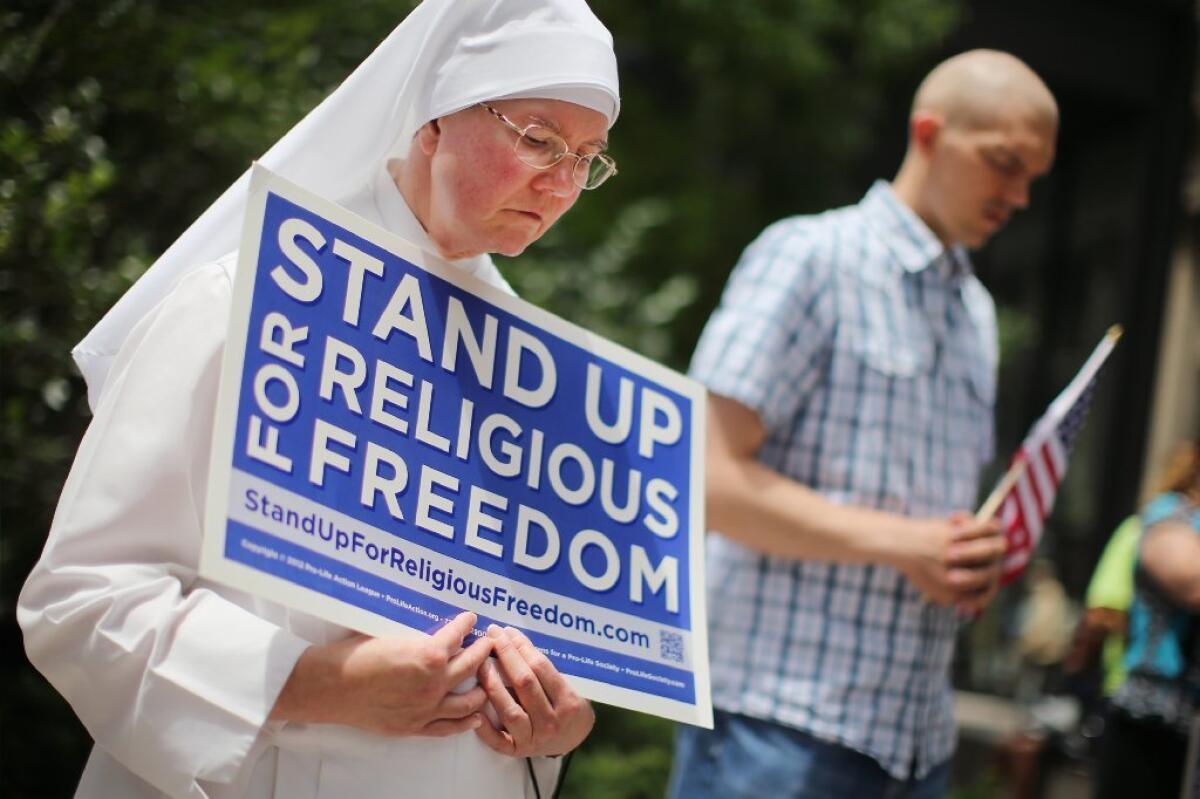Opinion: Justice Ginsburg and the Hobby Lobby threat to religious freedom

- Share via
The 35-page, few-holds-barred dissent to the Hobby Lobby ruling penned by Supreme Court Justice Ruth Bader Ginsburg contains many strong attacks on the majority’s thinking. But in one argument — when she wonders whether this argument will lead to Jehovah’s Witness employers not covering blood transfusions, or Scientologist employers not covering antidepressants— there’s a possibility that she’s wrong. And in a way, that’s the most frightening prospect of all.
This has been a court that overall tries to narrow its rulings to find a comfortable place for itself, and where personal biases can be all too easy to spot. And this court majority is clearly more comfortable with conservative Christian values — and less comfortable with the controversies of family planning — than it is with those of other religions. Although it would be a terrible thing for employees to go without lifesaving treatments that happened to conflict with an employer’s religion, it would also be terrible if the court insisted that those treatments must be covered, because then it would be showing a preference for conservative Christian beliefs over other religious beliefs.
Just look at the decision — and the discussion — on the Mojave cross, a large cross erected on public land in the desert that honors the Christian war dead. The federal government “solved” the problem by allowing a land exchange that converted (pun intended) public land into private land so that the cross would be legal. And the court majority had no problem with this.
More disconcerting, Justice Antonin Scalia showed a dismaying tendency during arguments to think of the Christian religion as the religion that should count for all Americans. Here’s how the conversation went with American Civil Liberties lawyer Peter Eliasberg:
Scalia: It (the cross) is erected as a war memorial. I assume it is erected in honor of all the war dead. It’s the — the cross is the — is the most common symbol of ... the resting place of the dead, and it doesn’t seem to me — what would you have them erect? A cross — some conglomerate of a cross, a Star of David and, you know, a Muslim half-moon and star?
Eliasberg: Well, Justice Scalia, if I may go to your first point. The cross is the most common symbol of the resting place of Christians. I have been in Jewish cemeteries. There is never a cross on a tombstone of a Jew….
Scalia: I don’t think you can leap from that to the conclusion that the only war dead that that cross honors are the Christian war dead. I think that’s an outrageous conclusion.
Eliasberg: Well, my … point here is to say that there is a reason the Jewish war veterans came in and said we don’t feel honored by this cross. This cross can’t honor us because it is a religious symbol of another religion.
Justice Anthony M. Kennedy echoed Scalia’s sentiments when the court ruled on the issue. According to the Times story at the time:
“He [Kennedy] faulted the judges in California for having ‘concentrated solely on the religious aspects of the cross, divorced from its background and context. A Latin cross is not merely a reaffirmation of Christian beliefs. It is a symbol often used to honor and respect those whose heroic acts, notable contributions and patient striving help secure an honored place in history for this nation and its people,’ he wrote.”
I’ll venture to guess that only a Christian would believe that a cross is not merely a reflection of Christian beliefs. Beyond that, the court decision sets in writing the notion that Christianity, as the dominant religious belief, becomes the set point for making value decisions about what is right for all.
Ginsburg’s dissent isn’t an original thought. Many people have been wondering aloud and in writing over the past months about where the line would be drawn on medical coverage if a Christian employer’s religious beliefs could stop certain forms of coverage. (Though Ginsburg might have gotten it wrong when she questioned whether a Jewish employer could refuse to cover the replacement of a faulty heart valve with a pig’s valve. From what I can find online, if a pig valve is the way to save the person’s life, Jewish law would actually require that it be used, because preservation of life takes precedence over kosher law.)
But given more time to view this possibility in context, it’s hard to know which damaging result to hope for. Is it worse if the court were to rule in favor of the owners of other businesses who are members of minority religions that hold to beliefs against various forms of health coverage? And thus deny lifesaving treatments to employees?
Or would it be worse if the court were to fake its way out of the dilemma by deciding that antidepressants or blood transfusions or vaccines are more important to public health than an employer’s religious beliefs, thus engraving in stone an anti-constitutional policy of placing one religion over others?
Ginsburg got this much entirely correct: The court majority has painted itself into an untenable corner. Either lifesaving medical care or religious freedom stands to suffer here.
More to Read
A cure for the common opinion
Get thought-provoking perspectives with our weekly newsletter.
You may occasionally receive promotional content from the Los Angeles Times.










